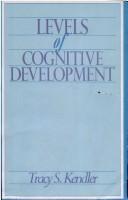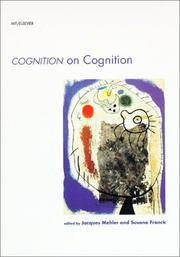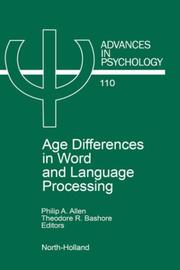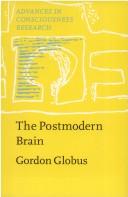| Listing 1 - 10 of 21 | << page >> |
Sort by
|

ISBN: 0805806806 Year: 1995 Publisher: Hove Erlbaum
Abstract | Keywords | Export | Availability | Bookmark
 Loading...
Loading...Choose an application
- Reference Manager
- EndNote
- RefWorks (Direct export to RefWorks)
Cognition --- Human information processing --- Psychology, Comparative --- Thought and thinking
Book
ISBN: 0863773621 Year: 1995 Publisher: Hove Erlbaum
Abstract | Keywords | Export | Availability | Bookmark
 Loading...
Loading...Choose an application
- Reference Manager
- EndNote
- RefWorks (Direct export to RefWorks)
Cognition --- Cognitive science --- Human information processing --- Sciences cognitives --- Information, Traitement de l', chez l'homme
Book
ISBN: 3764329335 0817629335 Year: 1995 Publisher: Basel ; Boston ; Berlin Birkhäuser Verlag
Abstract | Keywords | Export | Availability | Bookmark
 Loading...
Loading...Choose an application
- Reference Manager
- EndNote
- RefWorks (Direct export to RefWorks)

ISBN: 0262631679 0262315807 Year: 1995 Publisher: Cambridge (Mass.): MIT press
Abstract | Keywords | Export | Availability | Bookmark
 Loading...
Loading...Choose an application
- Reference Manager
- EndNote
- RefWorks (Direct export to RefWorks)
Cognition --- Human information processing --- Neuropsychology --- Psycholinguistics --- Language, Psychology of --- Language and languages --- Psychology of language --- Speech --- Linguistics --- Psychology --- Thought and thinking --- Neurophysiology --- Psychophysiology --- Information processing, Human --- Bionics --- Information theory in psychology --- Perception --- Psychological aspects --- Cognition. --- Human information processing. --- Neuropsychology. --- Psycholinguistics.
Book
ISBN: 0805819037 9780805819038 Year: 1995 Publisher: Hillsdale, N.J. : L. Erlbaum,
Abstract | Keywords | Export | Availability | Bookmark
 Loading...
Loading...Choose an application
- Reference Manager
- EndNote
- RefWorks (Direct export to RefWorks)
Psycholinguistics --- Human information processing --- Reading, Psychology of --- Information, Traitement de l', chez l'homme --- Psycholinguistique --- Lecture --- Psychologie

ISBN: 9780444817662 0444817662 9780080526867 0080526861 9786611186821 1281186821 Year: 1995 Volume: 110 Publisher: Amsterdam New York Elsevier
Abstract | Keywords | Export | Availability | Bookmark
 Loading...
Loading...Choose an application
- Reference Manager
- EndNote
- RefWorks (Direct export to RefWorks)
Component cognitive processes have played a critical role in the development of experimental aging research and theory in psychology as attested by articles published on this theme. However, in the last five to ten years, there has been a substantial increase in the number of articles attempting to isolate a single factor (or small subset of factors) responsible for age differences in information processing. This view of aging is frequently termed the complexity model of the generalized slowing model, the primary assumption being that age differences in cognition are due simply to a relatively
Cognition --- Human information processing --- Psycholinguistics --- Age factors --- Psycholinguistics. --- Language, Psychology of --- Language and languages --- Psychology of language --- Speech --- Linguistics --- Psychology --- Thought and thinking --- Age factors in human information processing --- Aging --- Age factors in cognition --- Ability, Influence of age on --- Age factors. --- Psychological aspects --- Cognition - Age factors --- Human information processing - Age factors

ISBN: 9027251223 9786613174512 1283174510 9027283605 9789027283603 9789027251220 1556191820 9781556191824 Year: 1995 Publisher: Amsterdam Philadelphia J. Benjamins
Abstract | Keywords | Export | Availability | Bookmark
 Loading...
Loading...Choose an application
- Reference Manager
- EndNote
- RefWorks (Direct export to RefWorks)
Questioning Consciousness brings together neuroscientific, psychological and phenomenological research, combining in a readable format recent developments in image research and neurology. It reassesses the mind-body relation and research on 'mental models', abstract concept formation, and acquisition of logical and apparently 'imageless' inference skills. It is argued that to be conscious of an object is essentially to imagine in a habituated way what would happen if we were to perform certain actions in relation to the object; and that mental images fit together to build up abstract co
Apperception. --- Consciousness. --- Human information processing. --- Philosophical anthropology --- Information processing, Human --- Bionics --- Information theory in psychology --- Perception --- Educational psychology --- Psychology --- Comprehension --- Apperception --- Mind and body --- Philosophy --- Spirit --- Self
Book
ISBN: 9516532810 9789516532816 Year: 1995 Volume: 106 Publisher: Helsinki : Societas scientiarum fennica = Finska vetenskaps-societeten,
Abstract | Keywords | Export | Availability | Bookmark
 Loading...
Loading...Choose an application
- Reference Manager
- EndNote
- RefWorks (Direct export to RefWorks)
Aphasia. --- Connectionism. --- Human information processing. --- Semantics. --- Agrammatism. --- Agrammatism --- Aphasia --- Connectionism --- Human information processing --- Semantics --- Formal semantics --- Semasiology --- Semiology (Semantics) --- Comparative linguistics --- Information theory --- Language and languages --- Lexicology --- Meaning (Psychology) --- Information processing, Human --- Bionics --- Information theory in psychology --- Perception --- Connexionism --- Cognition --- Brain --- Language disorders --- Speech disorders --- Agrammatic aphasia --- Agrammatologia --- Grammatical speech disorders --- Speech disorders, Grammatical --- Grammaticality (Linguistics) --- Diseases --- Aphasie

ISBN: 1283121891 9786613121899 9027284911 9789027284914 902725124X 9789027251244 1556191847 9781556191848 Year: 1995 Publisher: Amsterdam Philadelphia J. Benjamins Pub. Co.
Abstract | Keywords | Export | Availability | Bookmark
 Loading...
Loading...Choose an application
- Reference Manager
- EndNote
- RefWorks (Direct export to RefWorks)
Locating Consciousness argues that our qualitative experiences should be aligned with the activity of a single and distinct memory system in our mind/brain. Spelling out in detail what we do and do not know about phenomenological experience, this book denies the common view of consciousness as a central decision-making system. Instead, consciousness is viewed as a lower level dynamical structure underpinning our information processing. This new perspective affords novel solutions to a wide range of problems: the absent qualia, the binding problem, the inverted spectra, the specter of epiphenom
Consciousness. --- Philosophy of mind. --- Human information processing. --- Information processing, Human --- Bionics --- Information theory in psychology --- Perception --- Mind, Philosophy of --- Mind, Theory of --- Theory of mind --- Philosophy --- Cognitive science --- Metaphysics --- Philosophical anthropology --- Apperception --- Mind and body --- Psychology --- Spirit --- Self --- Consciousness --- Human information processing --- Philosophy of mind --- Cognitive psychology

ISBN: 1283174529 9786613174529 9027283613 9789027283610 1556191812 9781556191817 9027251215 9789027251213 Year: 1995 Publisher: Amsterdam Philadelphia J. Benjamins Pub. Co.
Abstract | Keywords | Export | Availability | Bookmark
 Loading...
Loading...Choose an application
- Reference Manager
- EndNote
- RefWorks (Direct export to RefWorks)
This interdisciplinary work discloses an unexpected coherence between recent concepts in brain science and postmodern thought. A nonlinear dynamical model of brain states is viewed as an autopoietic, autorhoetic, self-organizing, self-tuning eruption under multiple constraints and guided by an overarching optimization principle which insures conservation of invariances and enhancement of symmetries. The nonlinear dynamical brain as developed shows quantum nonlocality, undergoes chaotic regimes, and does not compute. Heidegger and Derrida are 'appropriated' as dynamical theorists who are concer
Human information processing. --- Connectionism. --- Postmodernism. --- Post-modernism --- Postmodernism (Philosophy) --- Arts, Modern --- Avant-garde (Aesthetics) --- Modernism (Art) --- Philosophy, Modern --- Post-postmodernism --- Connexionism --- Cognition --- Information processing, Human --- Bionics --- Information theory in psychology --- Perception --- Philosophical anthropology --- Cognitive psychology --- anno 1900-1999
| Listing 1 - 10 of 21 | << page >> |
Sort by
|

 Search
Search Feedback
Feedback About UniCat
About UniCat  Help
Help News
News